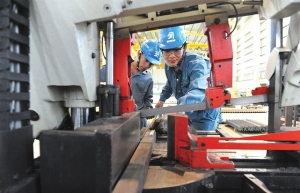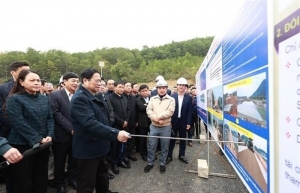Building a team to make most of funding in Vietnam
What are your thoughts on inbound investment trends so far in 2023?
 |
| Matthew Lourey, managing partner of professional corporate services company Acclime |
We’re not seeing any slowdown in intent, but we see slowdowns in large projects and capital and that’s because it’s lumpy and investors need to provide proof for their committed investment since 2022, which has been a good move to make foreign capital a better indicating figure.
We see a lot of variety from large and small companies who choose to set up back offices or continue to expand, none of that is different from the last 3-5 years. There’s also a lot in modern technology and using the technology teams that are here. It is still this desire to come in, get a foothold, understand the market and grow. In fact, right now we’re seeing an up-tick in new entities and foreign investors starting companies, people who want to build the foundations for the future.
There is still positive intent that Vietnam is where they need to be. How fast they grow strategically is going to depend on the markets and that is hard to predict how much money they end up bringing in, but they know they need to get started.
Do you see a change in the sectors that investors are looking at now?
Technology is driving, the manufacturing sector is evolving, and those who are already here are expanding and transitioning to be more technologically advanced. The difference from the past is that we’re seeing a lot of back-office service support, as well as engineers, designers, and highly qualified and tech-savvy Vietnamese get involved.
The services side and the technology side are changing. What was originally known as a cheap labour manufacturing destination 20 years ago is no longer seen as such, and has moved up the scale.
To give an example, I’ve got meetings with an Australian specialist engineering firm and the first place they called on when they wanted to expand was Vietnam. They have employed someone who has many years’ experience in Vietnam and they’ve got four or five locations in Australia. They want to employ 20-25 engineering experts in Vietnam and set up an entity here. The firm knows the talent pool that has the ability to take the company forward.
What we tend to find is companies like that. After two or three years, they can get a good team on board, then move to the next stage.
What do you think about merger and acquisition (M&A) prospects for this year?
Interestingly, in the last six months we’ve seen quite a lot of M&A transactions which are not large deal sizes but good value. The market is up and down, and transactions are always hard to predict, but we have seen quite a lot on the low lower side bought at a good valuation. The desire to be in Vietnam and to pay the right price has been there.
I think M&A prospects in Vietnam for this year comes in two aspects. One is anything to do with digital transformation technologies. We’re talking about anything from data centres to fintech wallets, or integrated online education platforms.
The other aspect is activity in environmental, social, and governance (ESG) consideration – businesses that have an element of that where others don’t. Manufacturers who have got sustainable inputs in their business, or who have factories that are powered by solar or renewables. Those sorts of businesses have a far bigger appetite for investors.
Consumers in Western countries want the products they buy to be sustainable and meet ESG requirements, and not many businesses can meet all those requirements. Those who can are in a much better position.
Acclime is quite actively involved with foreign-invested and foreign-owned startups in Vietnam. Could you share some insight about this type of work?
Many startups have needed us for their early set-up stages and then they move on. For fundraising, we often act for the buyer and carry out due diligence without conflict.
What is noticeable lately are entrepreneurs from Singapore, the Philippines, and Indonesia. They may not have headquarters in Vietnam, but they grew here first. We help both local groups that are run by foreigners, but also regional ones that treat Vietnam as their first location.
Singaporeans feel comfortable with Vietnam, they see it as accessible and affordable. Startups from the Philippines have experience with business processing and outsourcing and may be able to create something interesting here. Most of all, Vietnam is considered as an open market for most technology firms and it offers a practical startup-type environment.
However, being cautious that qualified staff is not cheap, and accessibility for labour is crucial. Businesses want readiness to work and they want it at a reasonable price; they want to be able to grow.
On the back of decreased inflows or lumpy inflows into factories, and there will be ups and downs, the services sector is definitely positive and IT or tech-driven activity will bubble along regardless.
 | Benefits of modest FDI weighed up Attracting smaller foreign projects may be the path to take for Vietnam as a worldwide minimum corporate tax rate kicks in, affecting the plans of major corporations. |
 | Vietnam eager to complete integral transport infrastructure to attract FDI Local authorities at all levels are eager to implement construction of transport infrastructure up and down the country. |
 | Top cities bear brunt of sluggish PCI Global strife and lingering pandemic ramifications are pulling the competitiveness of some Vietnamese cities and provinces down, with foreign-invested firms still struggling with the burden of regulatory procedures. |
What the stars mean:
★ Poor ★ ★ Promising ★★★ Good ★★★★ Very good ★★★★★ Exceptional
Related Contents
Latest News
More News
- SK Innovation-led consortium wins $2.3 billion LNG project in Nghe An (February 25, 2026 | 07:56)
- THACO opens $70 million manufacturing complex in Danang (February 25, 2026 | 07:54)
- Phu Quoc International Airport expansion approved to meet rising demand (February 24, 2026 | 10:00)
- Bac Giang International Logistics Centre faces land clearance barrier (February 24, 2026 | 08:00)
- Bright prospects abound in European investment (February 19, 2026 | 20:27)
- Internal strengths attest to commitment to progress (February 19, 2026 | 20:13)
- Vietnam, New Zealand seek level-up in ties (February 19, 2026 | 18:06)
- Untapped potential in relations with Indonesia (February 19, 2026 | 17:56)
- German strengths match Vietnamese aspirations (February 19, 2026 | 17:40)
- Kim Long Motor and AOJ Suzhou enter strategic partnership (February 16, 2026 | 13:27)

 Tag:
Tag:




















 Mobile Version
Mobile Version